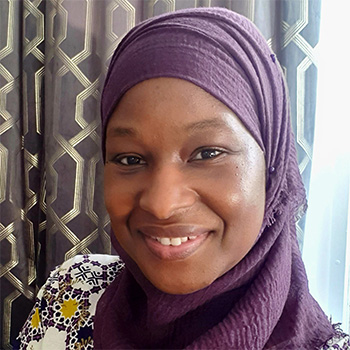Parallel Session B 09.30
Jamila Wakawa Zanna
University of Birmingham
After major events like natural disasters and conflict, internally displaced people (IDPs) can struggle with instability, poor housing and compromised health conditions for protracted periods. According to the International Displacement Monitoring Committee (2024), Nigeria has approximately 3.4 million IDPS. This paper focuses on the environmental health conditions of IDPs living in informal settlements in Abuja, Nigeria, emphasising the critical period of short to medium-term stabilisation following displacement.
Drawing on an empirical study undertaken, through semi-structured in-depth interviews (n=31) and focus group discussions (n=4) involving 61 internally displaced women and older adults in four host communities, this paper investigates how dire living circumstances affect the health and well-being of the displaced. The study used a mixed-methods approach comprising observational data collecting, focus group talks, and in-depth interviews.
Our findings highlight a complicated network of interconnected obstacles that IDPs experience while living in temporary housing. Overcrowded and temporary housing offers little shelter from adverse weather conditions, while damaged infrastructure raises security concerns. Shared sanitation facilities and limited toilet access frequently lead to open defecation, which increases the risk and spread of infectious disease epidemics within and outside the communities. Improper waste management, especially the discharge of rubbish in surrounding rivers, causes water contamination and other health problems. Pest infestations, particularly rodents and insects, worsen living circumstances and add to mental stress.
The study emphasises how these environmental health issues disproportionately affect vulnerable members of the communities. For example, women face heightened risks of harassment and violence when using shared sanitation facilities. Older individuals encounter challenges in obtaining clean water, adequate nutrition, and mobility issues in makeshift shelters.
Notwithstanding these hardships, the study reveals examples of IDPs' resilience and adaptive tactics. Community-led waste management and hygiene maintenance projects show that grassroots solutions can help to stabilise post-displacement environments. This research advocates for a deeper understanding of the health-housing nexus in displacement settings, emphasising the importance of focused interventions addressing immediate and medium-term requirements. It advocates for policy measures that acknowledge the particular difficulties experienced by various demographic groups and incorporate health issues into housing and infrastructure design for displaced people.
Recommendation:
- Introducing gender-sensitive sanitary facilities to improve safety and dignity.
- Developing community-based pest control solutions that reduce chemical exposure
- Improving waste management systems to minimise environmental degradation and associated health problems.
- Improving temporary dwelling designs to survive local temperature conditions and give enough privacy.
This study adds to the broader discussions of community resilience and recovery after major events by giving insight into the lived experiences of IDPs in Nigeria. It emphasises the crucial need to address environmental health issues in temporary settlements as a first step towards rebuilding lives and promoting long-term community stability.
About the presenter
 Dr Jamila Musa Wakawa-Zanna is an interdisciplinary researcher and educator specialising in environmental health, displacement, and social justice. She holds a PhD from the University of Birmingham, where her research explored the lived experiences of internally displaced women and older adults in Nigeria, focusing on how environmental health conditions impact their well-being. Her work integrates perspectives from urban and feminist geographies, as well as vulnerability and human needs theory, to examine housing and health access, camp management, and resilience strategies in displacement settings.
Dr Jamila Musa Wakawa-Zanna is an interdisciplinary researcher and educator specialising in environmental health, displacement, and social justice. She holds a PhD from the University of Birmingham, where her research explored the lived experiences of internally displaced women and older adults in Nigeria, focusing on how environmental health conditions impact their well-being. Her work integrates perspectives from urban and feminist geographies, as well as vulnerability and human needs theory, to examine housing and health access, camp management, and resilience strategies in displacement settings.
Dr Wakawa-Zanna has an extensive background in public and environmental health, having worked with the National Primary Health Care Development Agency in Nigeria and the Polio Emergency Operation Centre on polio eradication initiatives and maternal health programs. She also served as a Teaching Resource Developer and Postgraduate Teaching Assistant at the University of Birmingham, designing inclusive curricula and teaching and mentoring students.
In addition to her work in academia, she is involved in the community, helping displaced families with housing, food, and hygiene projects. Dr Wakawa-Zanna is a proponent of evidence-based policymaking, and her work has influenced debates on public health initiatives, housing, and climate resilience.
